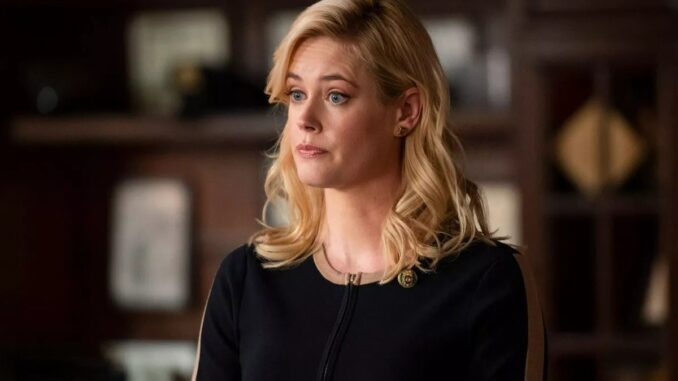
As Blue Bloods nears its final episodes, fans and cast alike find themselves grappling with the prospect of a world without the Reagan family. The CBS procedural, with its unique blend of family dynamics and police work, has been a staple of network television since its premiere in 2011. Unlike typical cop shows that focus on a precinct or squad, Blue Bloods is built around the Reagan family, led by Tom Selleck’s character, NYPD Commissioner Frank Reagan. This focus on family values interwoven with policing has given the show a unique niche and lasting popularity. But as CBS moves toward ending the series, is there a possibility that it could live on through another network?

In a recent interview, Abigail Hawk, who plays Detective Abigail Baker, Frank Reagan’s trusted aide, shed light on this pressing question. While Hawk shared a glimmer of hope, her comments reflected an overall skepticism that another network would be able or willing to pick up the show after CBS’s decision to cancel it. She admitted, “I don’t think there’s a possibility of it going to another network—I know that there’s been a bit of chatter about that, but I don’t think that that’s a viable option given the talks that we’ve had with the cast and the producers and things like that.” Still, she kept the spirit of possibility alive, adding, “Hope floats, and I think it’s necessary to have something to hang on to, and we would all certainly drop everything and make that happen.”
Hawk’s acknowledgment of the obstacles to continuing Blue Bloods on another network is understandable. Networks are generally hesitant to pick up shows that have concluded on another major broadcaster. The logistics, cost negotiations, and creative direction required to transfer a show with such a large ensemble cast would be daunting. Additionally, Blue Bloods has been a significant investment for CBS, both financially and in terms of brand identity. It would be challenging for another network to replicate that support and commitment.
Why CBS Is Ending Blue Bloods
After nearly fifteen years on air, CBS decided to pull the plug on Blue Bloods. This move, though surprising given the show’s popularity, aligns with the broader industry trend of networks reevaluating their programming line-ups to remain financially sustainable. As streaming services grow and audiences fragment, long-running network shows are increasingly viewed as costly compared to the potential revenue they generate. CBS, like other networks, is attempting to freshen its roster with new content, aimed perhaps at capturing younger or more diverse audiences.

Despite the show’s declining ratings over time, Blue Bloods was still one of the highest-rated scripted programs on television in 2024. This performance would typically secure a show’s spot on a network’s lineup. Yet, even with this success, CBS remained committed to moving forward with the cancellation. Reports suggest that costs were a key factor in the decision. Blue Bloods’ large, experienced cast and high production values make it an expensive show to maintain. Networks are increasingly prioritizing cheaper-to-produce content or shows with shorter seasons to lower costs.
Fan and Cast Reactions to the Cancellation
The show’s loyal fanbase was, unsurprisingly, shocked and disappointed by the news. Since the beginning, viewers have appreciated the values, family bonds, and emotional depth that the Reagan family brought to their screens every week. The announcement of the show’s end sparked waves of outcry, with fans calling for its continuation or a potential spinoff. Online petitions, fan campaigns, and social media movements have emerged as a testament to the show’s impact.
The Blue Bloods cast, too, has been vocal about their sadness over the cancellation. In interviews and press events leading up to the final season, they’ve shared their thoughts on what the show meant to them, emphasizing the family-like atmosphere both on and off-screen. Tom Selleck, who has portrayed Frank Reagan for all fourteen seasons, expressed his appreciation for the fans who have stayed with the show over the years. He mentioned that Blue Bloods has been a unique and fulfilling experience and that its departure is bittersweet.
The actors have also emphasized that they would be willing to reunite if given the opportunity. Abigail Hawk, in particular, highlighted the sense of loyalty that both she and her castmates feel for the series and its characters. Despite her skepticism about another network picking up Blue Bloods, she emphasized that they would be “ready to drop everything” if there was a way to bring the show back.
Could Another Network Really Save Blue Bloods?
While the desire to keep Blue Bloods alive is palpable, especially among its cast, several challenges stand in the way. Network transitions are notoriously complex, often resulting in budget cuts, character changes, or different creative directions that may alter the show’s core appeal. For a family-centric drama like Blue Bloods, maintaining continuity in storytelling and character arcs is crucial. Given CBS’s attachment to the show and its high production costs, another network or streaming service would need to invest significantly to maintain the quality that fans have come to expect.
Additionally, streaming platforms typically prefer to develop new, original content rather than take on long-running series from other networks. Many of today’s streaming audiences are drawn to fresh stories or reboots rather than continuations of shows with extensive histories. Although there are some examples of shows successfully transitioning to new homes—Brooklyn Nine-Nine’s move to NBC, for example—these instances are rare and usually involve shows with shorter runs and lower production costs.
The Possibility of a Spinoff
One alternative to the full continuation of Blue Bloods is the idea of a spinoff. This approach has worked for numerous long-running series, such as NCIS and Law & Order, allowing networks to retain elements of beloved shows while introducing new narratives or focusing on specific characters. A Blue Bloods spinoff could center around one of the Reagan family members or focus on a different part of the NYPD, thus preserving some of the elements that fans cherish while cutting costs.
While there has been some buzz around the idea of a Blue Bloods spinoff, CBS has not announced any plans for such a project. For fans, the idea of seeing the Reagans’ legacy continue, even in a different form, might soften the blow of the show’s conclusion. If CBS decides to explore this option, it would offer a compromise that maintains a connection to the original series while potentially attracting new audiences.
Preparing for the Final Farewell
As Blue Bloods approaches its finale, CBS and the show’s creators are focused on giving fans a memorable send-off. The cast has been busy with promotional events, interviews, and social media interactions to encourage fans to tune in for the last episodes. For the cast, this season is a chance to savor their final moments as the Reagans and to thank fans for their loyalty over the years.
In the end, Blue Bloods’ impending conclusion is a reminder of the changing landscape of television. Even as beloved shows like this one come to an end, new stories will emerge to captivate audiences. The Reagan family’s journey may be ending, but its impact on viewers will remain. And for fans, as Abigail Hawk so beautifully put it, “Hope floats.” Perhaps someday, in some way, the Reagan family will return. Until then, the final season of Blue Bloods is an opportunity to celebrate everything that made this show a treasured part of television history.
